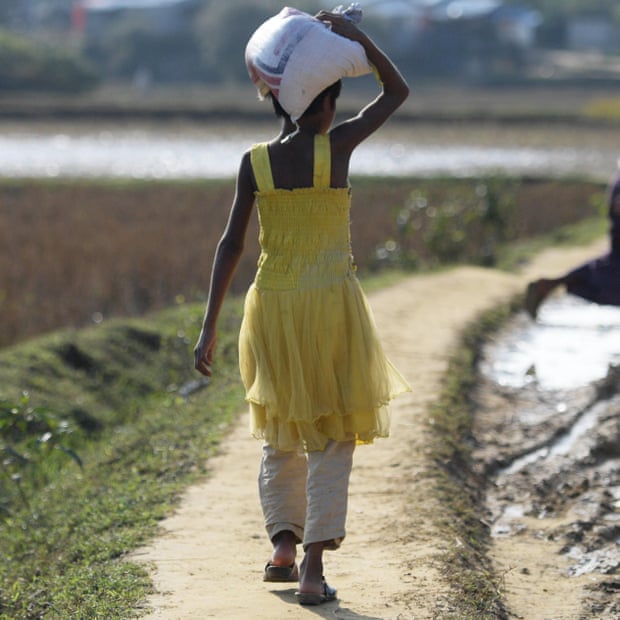The US has announced it is withdrawing military assistance from Myanmar units and officers involved in violence against Rohingya Muslims that has triggered a mass exodus and humanitarian crisis.
“We express our gravest concern with recent events in Rakhine state and the violent, traumatic abuses Rohingya and other communities have endured,” said a state department spokeswoman, Heather Nauert, announcing the punitive measures.
“It is imperative that any individuals or entities responsible for atrocities, including non-state actors and vigilantes, be held accountable.”
Washington already had restrictions on its engagement with Myanmar’s armed forces, as well as a long-running embargo on all military sales, and the withdrawal of military aid serves to reinforce that position.
Last week the secretary of state, Rex Tillerson, said the US held Myanmar’s military leadership accountable for the Rohingya refugee crisis, drawing a distinction with Aung San Suu Kyi’s civilian government.
The world would not stand and “be witness to the atrocities that have been reported,” he said, adding that the military must be restrained.
On Tuesday the Associated Press reported that US officials were now preparing a recommendation for Tillerson to go further by declaring that “ethnic cleansing” was occurring against the Rohingya.
Tillerson could receive the recommendation as early as this week, officials familiar with the process said. Tillerson will then decide whether to adopt the advice of his agency’s policy experts and lawyers.
Militant attacks on Myanmar security forces in Rakhine sparked an army crackdown that has already been likened to ethnic cleansing by the UN. More than 600,000 members of the minority Muslim group have fled across the border into Bangladesh since late August.
The state department said it had halted its consideration of travel waivers for senior Myanmar military leaders and was considering targeted economic measures against individuals, along with targeted sanctions.
The US has rescinded invitations to senior members of Myanmar’s security forces to US-sponsored events and is pressing for “unhindered access” to the affected areas for a UN fact-finding mission, international organisations and the media.
“The government of Burma, including its armed forces, must take immediate action to ensure peace and security; implement commitments to ensure humanitarian access to communities in desperate need; facilitate the safe and voluntary return of those who have fled or been displaced in Rakhine state; and address the root causes of systematic discrimination against the Rohingya,” Nauert said.
Donald Trump is due to make his maiden visit to the region early next month when he will attend a summit of Asean countries, including Myanmar, in Manila.
The measures announced by the state department are the strongest US response so far to the months-long Rohingya crisis but fall short of the most drastic tools at Washington’s disposal, such as reimposing broader economic sanctions suspended under the Obama administration.
If Tillerson does announce that the US believes ethnic cleansing has occurred, it would greatly raise pressure on the Trump administration to act. This could include further sanctions against Myanmar, a country that Washington has repeatedly lauded for its 2015 democratic transition that brought Aung San Suu Kyi to power.
Q&AWho are the Rohingya and what happened to them in Myanmar?
Show

Described as the world’s most persecuted people, 1.1 million Rohingya people live in Myanmar. They live predominately in Rakhine state, where they have co-existed uneasily alongside Buddhists for decades.
Rohingya people say they are descendants of Muslims, perhaps Persian and Arab traders, who came to Myanmar generations ago. Unlike the Buddhist community, they speak a language similar to the Bengali dialect of Chittagong in Bangladesh.
The Rohingya are reviled by many in Myanmar as illegal immigrants and suffer from systematic discrimination. The Myanmar government treats them as stateless people, denying them citizenship. Stringent restrictions have been placed on Rohingya people’s freedom of movement, access to medical assistance, education and other basic services.
Violence broke out in northern Rakhine state in August 2017, when militants attacked government forces. In response, security forces supported by Buddhist militia launched a “clearance operation” that ultimately killed at least 1,000 people and forced more than 600,000 to flee their homes. The UN’s top human rights official said the military’s response was "clearly disproportionate” to insurgent attacks and warned that Myanmar’s treatment of its Rohingya minority appears to be a "textbook example” of ethnic cleansing.
When Aung San Suu Kyi rose to power there were high hopes that the Nobel peace prize winner would help heal Myanmar's entrenched ethnic divides. But she has been accused of standing by while violence is committed against the Rohingya.
In 2019, judges at the international criminal court authorised a full-scale investigation into the allegations of mass persecution and crimes against humanity. On 10 December 2019, the international court of justice in The Hague opened a case alleging genocide brought by the Gambia.
Critics have accused the Trump administration of acting too slowly and timidly in response to the Rohingya crisis.
Rohingya Muslims have been systematically deprived of basic rights over decades in majority Buddhist Myanmar. In the latest crackdown, Myanmar’s security forces have fired indiscriminately on unarmed civilians, including children, and committed widespread sexual violence, according to UN investigators.
Agence France-Presse, the Associated Press and Reuters contributed to this report.
